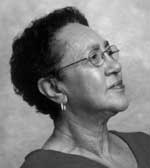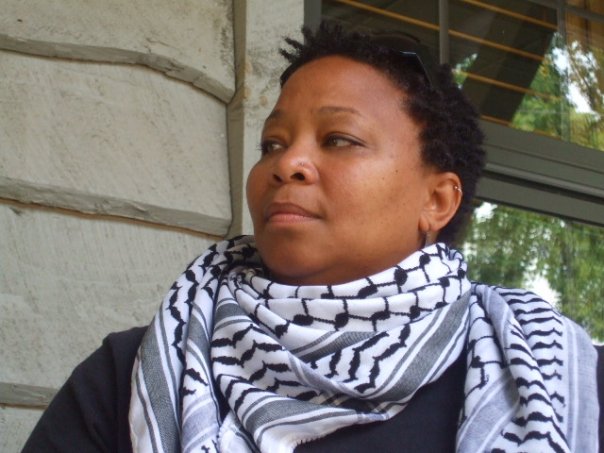Off-the-Hook Black Feminist Mentorship: An Anti-Capitalist Re-evaluation
A lot of times, June Jordan couldn’t pay her phone bill. I held the disconnection notices in my own hands, sitting hungry and enthralled in the Black Feminist poet, educator, revolutionary’s papers in the Schlessinger Archives at Harvard.
That morning I rode the train from my sista-friend’s grandma’s house in Roxbury, where she fed a block-full of cousins out of her amazing garden/urban orchard cattycorner from a poison-filled produce-empty cornerstore into Cambridge, where the police-violence-bought white privilege on the faces of the students and passersby made me want to slap a white person. Trust June Jordan to bring me to a place of rage.
I sat contemplating what set of circumstances allowed me to be sitting up at Harvard looking at June Jordan’s phone disconnection notices and folders filled with letters where people mentioned that they tried to call her but couldn’t get through. And I thought of at least two things:
- What immediately made my trip to Harvard to be the very first researcher to visit June Jordan’s papers possible, after harassing the kind archivists every day until they confirmed that the papers were processed and ready to view was the hospitality of Bonita’s grandma: an old Black food-growing woman who rarely left Roxbury, focused on feeding generations of her family love-grown food that might counteract the draining poison of Boston’s intense racial violence.
- And the obvious gratitude goes to June Jordan herself, who believed that telling the truth, and being where her people and the future we deserved needed her to be was more important than knowing she could pay bills on time. There were times she didn’t have food for herself and her son over everslow honoraria checks and writer’s fees. She was honest about it in her collection Civil Wars. A Black single mom not knowing if she could give her kid Christmas or even heat the apartment.
And the same love, risk, and accountability demonstrated by Bonita’s grandma and June Jordan is what makes this moment possible for me as a community-accountable scholar, teacher, and artist. So what does this have to do with mentorship?
I am telling you this to explain why, in this forum on mentorship on a website created by and mostly read by Black Feminist university-engaged scholars, I am skipping over the many cherished mentors I have within the academy and the publishing and archiving worlds. I am skipping over wonderful people who have raised me, fed me, affirmed and inspired me, to talk instead about the mentors with whom I have grown vegetables in the erstwhile tobacco dirt of North Carolina. Today I am not focusing on my mentors who are nerd-famous uber-published senior named-chair Black Feminist academics and administrators (and who honestly complain in weary voices about how many of us young scholars demand their mentorship). Instead, I am focusing on those mentors who have had such a major impact on my everyday life here in Durham and the decisions that have taken me to recreate the meaning of community accountable intellectual, spiritual love infused education and rooted artistry.
Today I want to tell you about Mama Nayo and Mama Nia, who I preface with “Mama” less for cultural nationalist throwback reasons than for the fact that like my mother, they are deserving of more respect then I can generate every time I say their names. Mama. Because they have a rebirthing influence on my days, and these are the off-the-hook mentors I want to tell you about in the name of June Jordan’s disconnected phone.
Mama Nayo Barbara Watkins, now an ancestor, was a Black Arts South warrior and healer. Power poet and acclaimed people’s playwright, she used interactive theater to facilitate communities telling the submerged histories of their own struggle and triumph. She created an educational center for parents and children learning through learning disabilities in the name of her son. She worked to make Black artists central to Alternate ROOTS, an arts and activism organization supporting Southern artists. Mama Nia Wilson heads SpiritHouse, a local organization using arts-based interventions to lift up the spiritual and critical strategic leadership of the people most impacted by the prison industrial complex here in Durham, running a community center and several programs out of her home and scraping funds together to bring youth leaders around the country to learn about the connections between oppression and brilliance everywhere.
I am not writing this essay so that these mentors will know how much I love and admire them. They already know.
 Mama Nayo knows from the last days of her life when I watched the mainstream news with her during the Obama nomination process (and I hate the mainstream news, especially at election time) how I fed her dog (and I’m so allergic to dogs). Only for Mama Nayo. She knows from how I listened to her tell me about how she went into an old black woman’s kitchen on some voter registration activist mission and saw one of her very own broadsides up on the wall above the stove. And how she listened to this old black woman talking about how she reads this poem, this black-woman-self-love-everybody-better-know-it poem, not knowing Nayo, who wrote the poem, was standing right there. Saying “Yes. You know that poem girl? That’s my poem!” She said it and Nayo always remembered and gave it to me to always remember now. She knows from how I stood in line running errands at the oldest Black bank in Durham (Mechanics and Farmers) and the pharmacy dropping off checks and picking up the prescription that made her dying days less agonizing, embodying family so the teller and the pharmacist would both say: “You must be here for Nayo. Nayo’s people. Y’all sure do favor.” She knows from her place on my altar, in my heart, in all the air that surrounds me. She knows how happy I would be if one day someone compared me and my way and my work to her and her way and her brilliance.
Mama Nayo knows from the last days of her life when I watched the mainstream news with her during the Obama nomination process (and I hate the mainstream news, especially at election time) how I fed her dog (and I’m so allergic to dogs). Only for Mama Nayo. She knows from how I listened to her tell me about how she went into an old black woman’s kitchen on some voter registration activist mission and saw one of her very own broadsides up on the wall above the stove. And how she listened to this old black woman talking about how she reads this poem, this black-woman-self-love-everybody-better-know-it poem, not knowing Nayo, who wrote the poem, was standing right there. Saying “Yes. You know that poem girl? That’s my poem!” She said it and Nayo always remembered and gave it to me to always remember now. She knows from how I stood in line running errands at the oldest Black bank in Durham (Mechanics and Farmers) and the pharmacy dropping off checks and picking up the prescription that made her dying days less agonizing, embodying family so the teller and the pharmacist would both say: “You must be here for Nayo. Nayo’s people. Y’all sure do favor.” She knows from her place on my altar, in my heart, in all the air that surrounds me. She knows how happy I would be if one day someone compared me and my way and my work to her and her way and her brilliance.
And Mama Nia knows from the voicemail waiting on her phone right now, love messages early in the morning when we’re the only ones awake and on Facebook already. Tulsi everydayness towards balance, towards you do not have to do it all yourself. She knows that I praise the day we met in the street. How I cry every time that her way too talented son plays the drum or gets impossibly taller or writes a poem. How her daughter is a chosen sister who defends my life, love, and laughter, ready to take off her shoes and fight if she needs to. She already knows how honored I am to have been working beside her in classrooms, clearings, courtrooms, living rooms in so many organizations and coalitions and committees for the past seven years and for as long into the future as I can imagine. And since she too was mentored by Mama Nayo up to her very last day, she knows exactly that mentorship, and grandmentorship looks like exactly like love.
So this piece is not for Mama Nayo or Mama Nia, though they make it possible in my hands. This piece is for you. Because I want you to know. Especially those of you Ph.D. or tenure-pursuant Black feminists seeking mentors. I want you to know that my primary mentors here in my life who hold such sway over my decisions and the contents of my days, over what to write about and where to be, are Black women who were and are single moms using public assistance to free their time to free our people.
And I want you to know that because I want you to know that there is no bourgeois scarcity when it comes to Black feminist mentorship. It is no use fighting each other or feeling like we have to compete for one of five tokenized mentors at the top who may be so stressed out by interim chairing two programs and half of a department that they should not be holding the whole task of mentoring you anyway.
The more mentors we have, in more places, the better off we are, lest capitalism trick us into believing that only the well-funded, institutionally connected, socially secure Black feminist intellectuals have gifts for our sharp, critical anti-capitalist lifetimes.
The fact that my abundant ecology of living and ancestral mentors includes moms using public assistance, broke filmmakers, struggling trans kids, non-profit divas, barely not starving poets and more is what makes it possible for me to live untrapped every day with infinite options for useful and fulfilling love-fueled brilliance. This is what Audre Lorde meant when she pointed out that the only folks who are scared by the fact that “the master’s tools will never dismantle the master’s house” are those who see the “master’s house (aka the university) as their only source of support.” Through practice and through the lives of my many mentors I know the academy is not the only nor the primary source of support for my brilliance and that the tenure track is only one of infinite paths that a Black feminist can choose to take.
I have the deep luxury of not measuring my impact, success, and purposefulness on funding, tenure, bills paid on time–and I want that freedom for you. Build a base of badass mentors that take different risks, make different sacrifices from each other, work in different conditions and with different styles. Affirm the fact that your Black feminist brilliance could lead you anywhere, not just further into ivory privileges. Let predictable sources write letters trying to find you. Get off the hook, like June Jordan. J
Love,
Alexis
P.S. If you would like to be on the email notification list for ReMastered Brilliance, a new service I am starting to reconnect visionary underrepresented graduate students with their communities of accountability and a purposeful diverse ecology of brilliance, email me at brokenbeautifulpress@gmail.com.


28 Comments